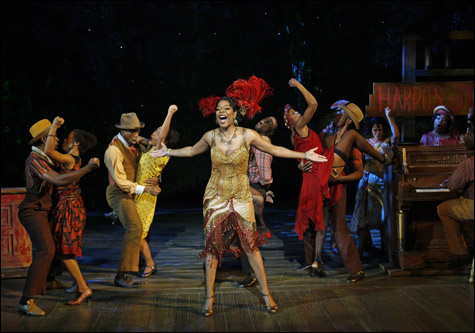
PUSHING DA BUTTON: Angela Robinson, from the Broadway run, is a natty, sensuous Shug. |
The color purple describes both kids' icon Barney and a bruise. And sure enough, both child-friendly uplift and florid abrasion are wound into the sprawling, heartfelt musical based on Alice Walker's Pulitzer-winning 1982 novel about a beaten-down young black woman learning to value herself over the course of 40 years in the first half of the 20th century. On consideration, The Color Purple (at the Wang Theatre through June 28) would seem an unlikely candidate for Broadway, where the Oprah Winfrey–produced cakewalk down some mean Georgia roads in Jim Crow days nonetheless ran for more than two years. The show has been marketed as "the musical about love." Of course, a musical ballyhoo'd as being about incest, rape, racism, domestic abuse, and lesbian awakening might not sell too many tickets.
To the show's credit, most of the miserable particulars of Walker heroine Celie's journey from self-abnegation to strength are hit, if not hard. Fourteen when the curtain goes up in 1911, she is pregnant for the second time by the man she calls Pa, who whisks away her newborn child and marries her off to an African-American Simon Legree of a widowed farmer who wants her for a maid and punching bag. "Mister" would have preferred Celie's prettier sister, Nettie, and when Nettie won't just lie down and get raped, he throws her off his property, vowing that Celie will never hear from her sibling again. Cowed and abused, Celie osmoses empowerment from a few strong women thrown in her way, among them her stepson's big, defiant wife, Sofia, and her husband's blues-singer mistress, Shug Avery, who befriends the downtrodden heroine and awakes her to both sexual tenderness and the God in everything.
As written by Pulitzer-winning playwright Marsha Norman, the musical is faithful to the trajectory of the novel, which twists its way through all manner of sexist and racist persecution, not to mention four decades and several continents. Trouble is, the show rushes by its soul-trying events so fast, and in such a belting ecstasy of gospel, jazz, blues, and pop, that you hardly feel the sting — unless, of course, you brought it with you. If they don't mind the interposition of some broad comedy and the substitution of storybook sweep for vernacular poesy, devotees of the novel and of the 1985 Steven Spielberg film will get what they came for: the opportunity to relive Celie's rise from cruel usage to vindication, reunion, and entrepreneurial triumph. It's an emotional ride whose melodrama and spikes of joy are enhanced by a spirited if unmemorable score by pop songsmiths Brenda Russell, Allee Willis, and Stephen Bray.
And it's handsomely turned out at the Wang. Costume designer Paul Tazewell's hats for the quartet of knowing, gossipy Church Ladies who serve as a sort of Greek chorus are things of floral, architectural splendor. The impressive cast, moreover, includes several performers reprising roles they honed during the Broadway run. As Celie, the diminutive Kenita R. Miller deploys a voice bigger than she is, not to mention a throaty laugh that seems to contain the seeds of the emancipated Celie in the abject child. Angela Robinson is a natty, sensuous Shug, and Rufus Bonds Jr.'s stiff Mister develops a redeeming elasticity on the dance floor long before he repents of his evil ways.